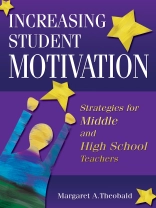Spark students′ motivation to learn and succeed beyond the formal years of schooling!
Every student enrolled in school can learn; however, the capacity for learning varies among students. As a result of a two-decade-long interest, author Margaret A. Theobald provides teachers with ideas and insights that can help support and motivate middle and high school students to do their best work. This unique book, which defines motivation, contains basic theories and a wealth of useful practical procedures. Easy to pick up, its simple approach and format will help school leaders apply and modify motivational strategies for all students while recognizing that each student is unique.
Written, developed, designed, and presented to teachers and school leaders for immediate application, this handbook provides:
- General frameworks for thinking about motivation
- Hundreds of strategies from middle and high school educators who have succeeded in motivating students to learn
- A deeper understanding of the needs of students as those needs relate to students′ motivational levels
Increasing Student Motivation fills an important niche in professional educational literature and will prove to be an invaluable resource for all educators who work with students and are concerned about how to help them maximize their potential.
Daftar Isi
Foreword by John A. Pohl
Acknowledgments
About the Author
Introduction
1. Motivation Is a Mindset
Each Student Learns
Mistakes Aid Learning
Positive Feedback Is Necessary
Self-Concept Affects the Mindset
Summary
2. Motivation Is Influenced Through Observation
Project Intensity and Enthusiasm
Model Self-Confidence
Summary
3. Motivation Is Affected by Timing
Timing of Needs Varies
Needs Drive Objectives
Summary
4. Motivation Is Independence
Teach Goal Setting
Encourage Performance Appraisal
Provide for Self-Reinforcement
Role-Play With Optional Actions
Summary
5. Motivation Is Reflected in Victory
Process Leads to Success
Success Comes From Finished Products
Summary
6. Motivation Involves Action
Opportunities for Active Learning
Situations for Hands-on Activities
Summary
7. Motivation Is Increased Through Transfer
Relate New to Old Learning
Adapt Tasks to Student Interests
Clarify the Abstract
Summary
8. Motivation Is Inherent to Individuality
Recognize Weaknesses and Strengths
Relate Cognitive Experiences to Abilities
Demonstrate Talents and Skills
Express One’s Differences From Others
Summary
9. Motivation Is Rooted in Ownership
Teach Responsibility
Involve Students in Decisions
Summary
10. Motivation Is Natural
Challenge Students
Encourage Student Expression
Acknowledge Student Views
Summary
Resource A: Strategies and Learning Styles
Resource B: Bloom’s Taxonomy, Cognitive
Resource C: Positive Word List
Resource D: Example, Student Goals
Resource E: Example, Student Lesson Plan
References
Index
Tentang Penulis
Margaret A. Theobald, Ed.D. has been at Southeast Missouri State University for the past twenty-four years and is a Professor in the Department of Middle and Secondary Education. She was a teacher at the middle and high school levels for more than 15 years in both public and parochial schools in Illinois and Missouri. She earned her doctorate in Curriculum and Instruction at Illinois State University with an emphasis on education at the middle level. She has served in several positions with the Missouri Middle School Association and its executive board, including the offices of secretary and president. Her research includes a statewide survey of middle-level practices and trends. The Missouri Middle School Association published the results of this survey in its’ 1994 Missouri Middle Level Practices and Trends: A Resource Directory. She was also co-author for the 1995 publication, The Middle School Principal, Corwin Press. She has made numerous presentations at both the state and national levels and has published several articles. Her most recent research has been in the area of teaching strategies and student motivation.












